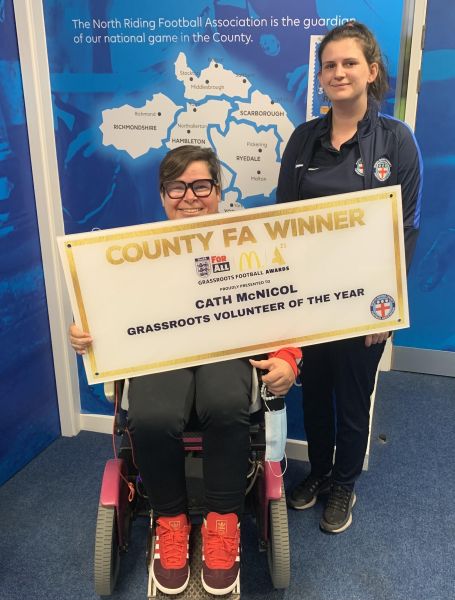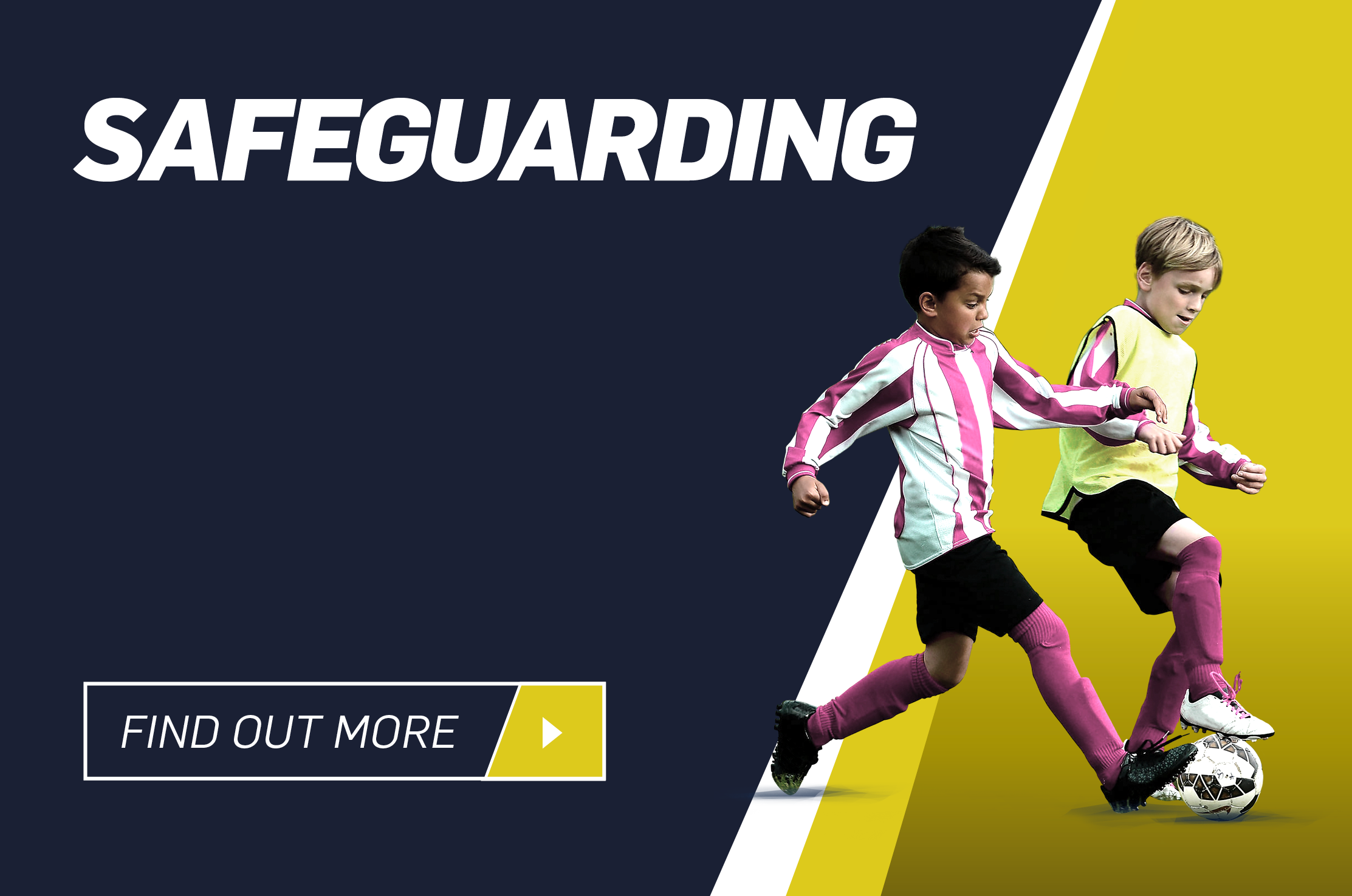Welfare at The WFA
Welfare at The WFA
This weekend, The Wheelchair Football Association are lending their full support to #PlaySafe – a national FA-led campaign in partnership with NSPCC to raise awareness of the importance of safeguarding in football.
The WFA are committed to safeguarding the welfare of all children and young people involved in Powerchair Football. We also extend this responsibility to every adult involved in Powerchair Football, whether as players, managers, coaches, referees, parents or spectators.
As The WFA’s Welfare Officer, Cath McNicol is responsible for acting as a voice for safeguarding within the Association, working with the committee to ensure best practice is adhered to and coordinating actions should a concern or referral arise.
Alongside her responsibilities at The WFA, Cath is both a player/coach at Middlesbrough PFC and an Engagement Officer at Pathfinders Neuromuscular Alliance. Within her role at Pathfinders, Cath keeps in touch with members and partners, puts on online events, and encourages members to produce content for their website. She also works on a project that gives young people the skills to put on their own online events.
Following her fantastic work at Middlesbrough PFC, Cath was recently named North Riding County FA’s Grassroots Volunteer of the Year for all of her amazing work at Middlebrough PFC. North Riding FA’s Donna Crowthers said:
“Cath McNicol is a very worthy winner of the North Riding FA Grassroots Football Volunteer Award 2021. The application we received for Cath highlighted her passion for the game she loves so much. She shows all the values we look for in an Award winner, demonstrating inclusivity, determination and respect. Without individuals like Cath, there would be no grassroots football; she is a real hero of the game.”
We asked Cath questions about her role as The WFA’s Welfare Officer and what clubs can do to ensure welfare/safeguarding within their clubs:


Welfare Officer Questions:
-
What does your role of WFA Welfare Officer entail?
“As Welfare Officer and Trustee for The WFA, I make sure safeguarding is at the heart of everything we do. As well as making sure each of our clubs are following safeguarding guidance and best practice, I also make sure safeguarding is on the agenda at every committee meeting.
I attend WFA National League events, and I make myself known to the Powerchair Football community. I am approachable and hope that players, families, and carers feel comfortable talking to me about any concerns.”
-
How can people get in contact with you?
“They can talk to me face to face at National League weekends. Or email me at welfare@thewfa.org.uk“
-
What are best practices for Welfare and Safeguarding within Powerchair clubs?
“Each club must have a dedicated Welfare Officer, regardless of the age of their players, that has attended the FA’s Welfare Officer workshop and hold an in-date DBS (valid for three years). The Club must also have a Safeguarding Children Policy in place and a policy for Adults at Risk.
The WFA encourages all Powerchair Football coaches to obtain their FA Introduction to Coaching Football (previously called FA Level One in coaching football).
Club committee members (Chairpersons, Secretaries, Treasurers & Welfare Officers) must complete the FA Safeguarding for Committee Members course and renew it every five years.”
-
Why do you think safeguarding is important within football?
“Safeguarding is everyone’s responsibility, and those involved in football clubs will gain trust from children in a relaxed environment outside of education. Measures must be in place to safeguard children, adults at risk and volunteers who work with them.”
-
What other roles do you have in Powerchair?
“Firstly, I am a player at Middlesbrough PFC. I support the Club in the role of Secretary and, of course, assist our Clubs Welfare Officer. I am also a FA Level One Coach and help coach our four teams, with abilities ranging from recreational to National League level football.
I have a background in teaching, and I enjoy coaching our young players and watching them develop. There was no Powerchair Football when I was a child; it’s great that this opportunity to play a team sport and develop those team skills at the same age as non-disabled peers is available now. I enjoy being part of this development.”
-
What measures have you taken at Middlesbrough to ensure safeguarding?
“At Middlesbrough, we follow the FA’s guidelines and best practices. All of our coaches have attained the FA’s Level One Coaching football qualification.
We ensure our Welfare Officer is well known within our club, displaying contact details alongside their photo at all training sessions. All of our players, parents, carers, coaches and committee members have signed a code of conduct and are aware of the FA’s Whistle Blowing policy.
Because of Powerchair football’s unique nature, allowing adults and children to play on the same team, it’s vital to ensure that safeguarding guidance is adhered to over social media, text and email. We don’t have team group texts; instead, group messaging is for adult players and parents of players under 18. Any communication by email or text between coaches and older youth players; parents are included either by cc’ing in an email or creating a group text.”
The Key Role of Welfare Officers
Football is proud to have a network of 8,500 welfare officers across the grassroots youth game, supporting safe and fun environments for everyone. If you are already a welfare officer, then thank you for all that you are doing. If you want to learn more about the role or consider becoming a welfare officer, the following information is for you.
Responsibilities- Welfare officers must:
- Be clear about the club’s/league’s responsibilities when running activities for children and young people.
- Help club/league personnel to recognise that safeguarding is everyone’s responsibility and to actively play their part
Prerequisites to being a Welfare Officer
To become a club welfare officer, you will need to:
- Attend The FA Safeguarding Children and Welfare Officer Workshops. Click here for more information
- Have an in-date FA Accepted Enhanced with Children’s Barring List Check
Make sure everyone knows you
To be effective as a Welfare officer it’s vital that everyone in your club/league knows who you are and how you can be contacted especially the players, parents and coaches. You should sit on the club/league committee and as a Club Welfare Officer, you should know your coaches and manager. If you are part of a large or expanding club/league you may wish to encourage the committee to appoint an additional welfare officer(s) to support the work you are doing. We would recommend clubs with more than 10 teams consider having additional welfare officers.
The club welfare officer safeguarding checklist will help you to ensure essential safeguards are placed within your club.
Respect
RESPECT is aimed at helping us all to work together to challenge and change unacceptable behaviour on the sidelines and the pitch. It’s a long-term commitment.
As a Welfare Officer, you have the chance to make a significant contribution to creating positive change. RESPECT outlines the standard of behaviour expected in football for everyone from league officials, players, parents, club officials, coaches and referees. It is all about creating a fun, safe environment and its core principles work in tandem with safeguarding children.
The FA Online Safeguarding Service
The FA Online Safeguarding Service is accessed through your local county FA website and enables welfare officers to keep track of the safeguarding education and criminal record check status of club officials, managers and coaches.
To get started download the online safeguarding service resource and contact your Local County FA.
Further Advice and Support
Every county FA has a designated Safeguarding Officer (DSO), usually referred to as the County FA Welfare Officer, This is your first point of contact for advice and support and it is important for you to know who they are and how to contact them.
The counties also host networking sessions so you can meet with the County FA welfare officer and other club and league welfare officers. We strongly encourage you to attend these sessions to remain current and up-to-date with best practices.


